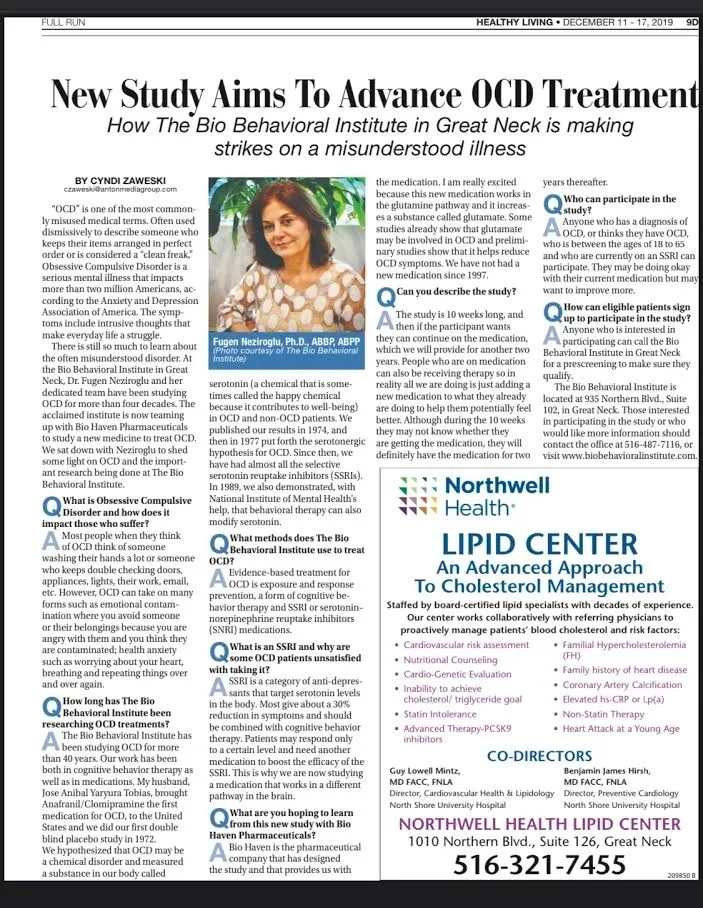Did You Know These 5 Behavioral Therapies for OCD Actually Work?
.webp)
Obsessive-compulsive disorder (OCD) is a mental health condition characterized by persistent, unwanted thoughts (obsessions) and repetitive behaviors (compulsions).
These symptoms can significantly interfere with daily life, making the pursuit of effective treatment crucial for those affected.
With advancements in OCD clinical trials and a deeper understanding of behavioral OCD, individuals now have access to a variety of evidence-based interventions. This article serves as a user-friendly guide to some of the best therapy options for managing OCD symptoms.
Cognitive Behavioral Therapy (CBT)
One of the most effective strategies for treating OCD is cognitive behavioral therapy (CBT). It is often considered the gold standard treatment due to its tailored approach to addressing the unique patterns of obsessive thoughts and compulsive behaviors.
How CBT Works
CBT helps individuals with OCD identify and challenge their irrational thoughts, as well as gradually reduce their compulsive behaviors. This therapy aims to change negative thinking patterns and develop healthier coping mechanisms.
Medical Treatment for OCD
For comprehensive care, medical treatment for OCD, including medication-assisted therapy, frequently complements behavioral methods. Medications such as selective serotonin reuptake inhibitors (SSRIs) may be prescribed to help manage symptoms of OCD.
Other Therapies for OCD
In addition to CBT and medication, other therapeutic approaches can be beneficial for managing OCD symptoms. These include:
- Acceptance and Commitment Therapy (ACT): Focuses on accepting intrusive thoughts without trying to control them while committing to actions aligned with personal values.
- Dialectical Behavior Therapy (DBT): Aims to improve emotional regulation and interpersonal skills through techniques like mindfulness and distress tolerance.
- Mindfulness-Based Therapies: Cultivate present-moment awareness and non-judgmental acceptance to reduce anxiety associated with obsessions.
Seeking Professional Help

For those ready to take the next step in their recovery journey, engaging with a world-renowned OCD and anxiety clinic that provides scientifically supported treatment and research focusing on Behavioral Therapy could be transformative.
Additional Resources
If you would like to assess your body image perception which can sometimes be related to OCD, you can take this body image quiz provided by the Bio Behavioral Institute.
This exploration into various therapeutic options underscores one message: effective treatments are available, and with the right help, managing OCD is an achievable goal.
1. Cognitive-behavioral therapy (CBT)
Cognitive-behavioral therapy, or CBT, is the cornerstone of OCD therapy. Recognized as a highly effective treatment, it addresses the complex interplay between thoughts and actions that characterize this disorder.
Key Aspects of CBT for OCD:
- Specificity to OCD: CBT focuses on the unique patterns of obsessive thoughts and compulsive behaviors. It teaches individuals how to break these cycles.
- Evidence-Based Techniques: The use of exposure and response prevention (ERP) is particularly important. ERP involves gradually facing fears or triggering thoughts while resisting the urge to engage in compulsive behaviors.
- Therapeutic Alliance: Success in CBT depends on working with a qualified therapist who can customize treatments to each person's needs. This creates a safe space for patients to confront their fears without relying on compulsions.
The Therapeutic Journey:
- Patients learn to recognize distorted thinking patterns and develop healthier ways of responding to obsessive thoughts.
- The skills learned in therapy are practiced in real-life situations, strengthening resilience against OCD symptoms.
For individuals struggling with the complexities of OCD, especially during challenging times like the COVID-19 pandemic where it can be difficult to distinguish between caution and compulsion, CBT can provide clarity and empowerment.
Similarly, those trapped in cycles of anxiety, avoidance, and self-destructive behaviors may find in CBT a way out of these patterns.
Behavioral therapy continues to evolve as an essential tool for managing OCD. Through ongoing dedication and expert support, individuals can use CBT to regain control over their lives and break free from obsessive-compulsive disorder.
2. Medication-Assisted Therapy
Another effective treatment approach for managing Obsessive-Compulsive Disorder (OCD) is Medication-Assisted Therapy. This form of therapy often complements behavioral interventions, providing an extra layer of support for individuals grappling with OCD symptoms.
Primarily, the medications used are a type of antidepressant known as SSRIs (Selective Serotonin Reuptake Inhibitors). SSRIs work by increasing the levels of serotonin—a neurotransmitter that aids in transmitting messages between brain cells—in the brain.
Some commonly prescribed SSRIs for OCD include Fluoxetine, Fluvoxamine, and Sertraline.
When incorporating medication into an individual's overall treatment plan, it's crucial to consider the following:
- Consultation with a healthcare provider: Before starting any medication, a thorough consultation with a healthcare provider is essential. It allows for an accurate diagnosis and understanding of the potential benefits and risks involved.
- Side-effects: All medications come with possible side effects. With SSRIs, these might include nausea, insomnia, and sexual dysfunction. It's important to openly discuss these potential effects with your healthcare provider to ensure you're well-informed.
- Individual Differences: Each person's experience with medication will differ. What works best for one might not be as effective for another. It's key to maintain regular communication with your healthcare provider about your experiences and any changes in symptoms.
Therapy combined with medication has been shown to be particularly helpful in reducing OCD symptoms. For instance, the School Refusal Program and programs addressing Eating Disorders often incorporate this dual treatment method.
Reaching out to professionals who can provide suitable guidance is vital when considering medication-assisted therapy as part of an OCD treatment plan.

Acceptance and Commitment Therapy (ACT)
Acceptance and Commitment Therapy, known as ACT, is a modern behavioral treatment that offers a unique approach for individuals dealing with Obsessive-Compulsive Disorder (OCD).
ACT focuses on enhancing psychological flexibility—enabling individuals to accept their thoughts and feelings rather than fighting or feeling guilty about them.
This acceptance, combined with a commitment to actions aligned with personal values, sets the stage for meaningful change.
Key Components of ACT for OCD:
- Cognitive Defusion: Learning techniques to reduce the tendency to treat thoughts, images, memories, and feelings as dangerous or harmful and instead see them as benign, transient psychological events.
- Acceptance: Encouraging individuals to embrace their internal experiences without trying to change their frequency or content.
- Mindfulness: Developing a present-moment awareness that allows individuals to detach from their obsessions and compulsions.
- Values Clarification: Helping individuals identify what is truly important and meaningful to them beyond their OCD symptoms.
- Committed Action: Supporting the engagement in behavior consistent with one's values, even in the presence of difficult internal experiences.
By integrating these elements, ACT facilitates a transformative process wherein patients learn to live a valued life while coexisting with the distressing thoughts and urges characteristic of OCD.
The emphasis on Radical Acceptance, a concept linked with ACT, can be particularly liberating for those who have felt trapped by their disorder.
Research indicates that when individuals adopt an accepting stance toward their inner experiences, they may experience improved functionality and quality of life.
The Bio Behavioral Institute, a world-renowned OCD and anxiety clinic providing scientifically supported treatment and research focusing on Bio-Behavioral Therapy, echoes this sentiment, recognizing the profound impact acceptance can have on mental health.
It is crucial for those considering ACT to work with therapists who are well-versed in this therapeutic model. Such professionals can tailor interventions to an individual's unique challenges and strengths. As part of a comprehensive treatment plan, ACT offers promising avenues for those seeking freedom from the constraints of OCD.
Additionally, individuals experiencing depersonalization as a result of their OCD may find ACT beneficial in addressing this distressing symptom as well.
Dialectical Behavior Therapy (DBT)
Dialectical Behavior Therapy (DBT) is another therapeutic approach that has shown promise for those struggling with OCD, particularly when emotion dysregulation is a significant concern.
This comprehensive treatment focuses on helping individuals manage their emotions more effectively, reducing the intensity of distressing feelings that often fuel obsessive thoughts and compulsive behaviors.
DBT incorporates several core components designed to provide multilevel support:
- Individual therapy: This involves one-on-one sessions where the focus is on addressing specific symptoms and challenges related to OCD.
- Skills training groups: Here, individuals learn practical strategies for managing emotions, tolerating distress, and improving interpersonal effectiveness.
- Phone coaching: This allows for real-time guidance and support in applying DBT skills during crises or particularly difficult moments.
- Therapist consultation team: Therapists themselves participate in a supportive team context to ensure they can provide the best possible care.
It's important to note that while DBT was originally developed for individuals with borderline personality disorder, its application has broadened over time to include other mental health conditions like OCD. The goal of DBT is not only symptom reduction but also enhancing the quality of life through the cultivation of effective coping strategies and resilience.
For individuals with specific conditions related to OCD such as Misophonia, DBT can be an effective treatment option. Misophonia refers to a strong aversion or hatred towards certain sounds, which can significantly impact daily functioning.
The bio-behavioral therapy provided by the Bio Behavioral Institute offers scientifically supported treatment and research for Misophonia as well as other OC-related disorders. This specialized approach ensures that individuals receive tailored interventions to address their unique challenges and improve their quality of life.
For a more in-depth understanding of how DBT can be applied to other OC-related disorders, you may find additional resources on the Bio Behavioral Institute's website beneficial.
5. Mindfulness-Based Therapies
Mindfulness-based therapies offer a different way to approach the treatment of Obsessive-Compulsive Disorder (OCD). These therapies focus on being fully aware of the present moment, and accepting thoughts and feelings without judgment, and include the following:
5.1 Mindfulness Meditation
In mindfulness meditation, individuals are taught to:
- Stay present and attuned to their experiences.
- Avoid trying to control or avoid their thoughts and feelings.
This can be especially helpful for those dealing with OCD. By becoming more aware that obsessive thoughts are temporary mental events and not absolute truths that require action, mindfulness meditation can weaken the influence of these thoughts.
For example, someone with contamination obsessions may learn through mindfulness practices to observe these thoughts and the accompanying anxiety without giving in to compulsive washing rituals.
5.2 Acceptance of Distressing Thoughts and Feelings
Mindfulness-based therapies also emphasize the importance of accepting distressing thoughts and feelings rather than trying to get rid of them. This acceptance can reduce the struggle with obsessions and compulsions, leading to less stress and a better quality of life.
While research in this area is still developing, initial studies indicate that mindfulness-based interventions can:
- Reduce the severity of OCD symptoms.
- Improve overall well-being.
It's important to note that mindfulness-based therapies are not a standalone treatment for OCD but should be incorporated into a comprehensive treatment plan. They can provide additional tools for managing symptoms when used under the guidance of a trained professional who understands OCD.
"Incorporating mindfulness strategies into my treatment plan has been incredibly helpful. It allows me to step back from my intrusive thoughts and recognize them for what they are – just thoughts." – Sarah, diagnosed with OCD
5.3 Mindfulness-Based Therapies for Daily Challenges
Mindfulness-based therapies can also be beneficial for managing other aspects of life while living with OCD, such as:
- Keeping The Coronavirus in Mind: These therapies provide powerful strategies to manage the stress and anxiety associated with the pandemic.
- Managing Body Image Issues: They can help individuals navigate the complex challenges of body image issues often associated with OCD.
These therapies provide powerful strategies to navigate life's challenges mindfully.
"Practicing mindfulness has helped me become more aware of my triggers and better equipped to handle them. It's like having an anchor amidst the chaos." – John, diagnosed with OCD
The Future of OCD Treatment: Ongoing Research and Innovations
The search for better OCD treatment options continues as researchers explore new and innovative methods. One area of focus that shows promise is neurostimulation techniques, which offer hope for individuals who haven't found relief with traditional therapies.
These advanced approaches, including Transcranial Magnetic Stimulation (TMS) and Deep Brain Stimulation (DBS), are gaining attention in the scientific community because they can target specific brain circuits involved in OCD.
1. Transcranial Magnetic Stimulation (TMS)
TMS is a non-invasive procedure that uses magnetic fields to stimulate specific parts of the brain. By doing so, it aims to reduce OCD symptoms by changing how the brain functions.
2. Deep Brain Stimulation (DBS)
DBS, on the other hand, is a more invasive technique that requires surgery. It involves placing electrodes in certain areas of the brain and using them to deliver electrical pulses. These pulses help regulate abnormal brain activity associated with OCD.
These advancements in OCD treatment are not only expanding our knowledge but also providing new options for individuals with severe forms of the disorder. As research continues, the future of OCD treatment looks towards personalized approaches that take into account each person's unique brain characteristics.
A Holistic Approach to Treatment
To make the most of these innovations, it's crucial to adopt a comprehensive approach that combines different therapeutic methods. This could include:
- Cognitive Behavioral Therapy (CBT): A type of talk therapy that helps individuals identify and change unhealthy thoughts and behaviors.
- Medication: The use of selective serotonin reuptake inhibitors (SSRIs) or other psychiatric drugs to manage symptoms.
- Support Groups: Peer-led communities where individuals with OCD can connect, share experiences, and provide support to one another.
At institutions like Bio-Behavioral Institute, where groundbreaking research on conditions like trichotillomania (a related disorder) is being conducted, there is a clear commitment to embracing new technologies while also offering evidence-based treatments.
The Role of Positive Psychology
In addition to these technological advancements, there is a broader trend in psychology that holds promise for individuals with OCD. The Positive Clinical Psychology framework emphasizes the importance of promoting well-being and building resilience alongside treating mental health issues.
These principles are essential for providing comprehensive care for OCD.
By staying informed about these developments, mental health professionals can enhance their ability to support clients with OCD. Similarly, individuals living with OCD may find hope in these potential treatments that could improve their quality of life in the future.
Finding Hope and Support: The Role of Loved Ones and Self-Care
For those navigating the path of OCD management, the role of a strong support system is crucial. Support for individuals with OCD often goes beyond therapy sessions and involves family members, friends, and dedicated support groups.
These networks offer emotional support, foster understanding, and assist individuals in applying coping mechanisms learned in therapy to real-life situations.
In addition to seeking support from others, incorporating regular self-care activities is an important aspect of managing OCD. Here are some self-care strategies that can be helpful:
- Engaging in regular physical exercise: Physical activity is known to decrease anxiety and enhance mood.
- Maintaining a nutritious diet: Eating well-balanced meals promotes overall health and well-being.
- Prioritizing sufficient sleep: Getting enough restful sleep is crucial for mental well-being.
- Practicing mindfulness exercises: Activities such as meditation can aid in developing a non-judgmental awareness of one's thoughts and experiences.
The journey may feel overwhelming at first, but it's important to remember that progress takes time. Even small steps forward indicate improvement. With a solid OCD support network and consistent self-care routine, managing OCD becomes a more attainable goal.

Seeking Effective Treatment is Key to Managing OCD
It's crucial to remember, obsessive-compulsive disorder (OCD) is manageable with the right treatment. A variety of effective OCD treatment options are available, each designed to address the unique challenges of this condition. Consider these points:
- Proactive Approach: Don't wait for symptoms to worsen. Seek help early from healthcare professionals experienced in treating OCD.
- Evidence-Based Therapies: Therapies like Cognitive-Behavioral Therapy (CBT) have shown significant success in managing OCD symptoms.
- Medication as a Complement: When required, medication can serve as a valuable complement to behavioral therapies, enhancing their effectiveness.
Above all, believe in the possibility of recovery. With the right support and treatment strategy, overcoming OCD is achievable. Every step taken towards seeking help is a step taken towards reclaiming control over your life.
FAQs (Frequently Asked Questions)
What is Cognitive-Behavioral Therapy (CBT) and how does it relate to OCD treatment?
Cognitive-behavioral therapy (CBT) is considered a gold standard treatment for OCD. It specifically targets obsessive thoughts and compulsive behaviors through practical strategies like exposure and response prevention. A qualified therapist plays a crucial role in delivering successful CBT interventions for OCD.
How can medication assist in the treatment of OCD?
Medication, particularly SSRIs, can be used as an adjunct to behavioral therapies for OCD treatment. It is important to consider the potential benefits and risks when incorporating medication into an individual's overall treatment plan.
What is Acceptance and Commitment Therapy (ACT) and how does it address OCD symptoms?
Acceptance and Commitment Therapy (ACT) has an emerging role in addressing OCD symptoms by promoting psychological flexibility and values-based action. It offers a different approach to managing OCD compared to traditional CBT.
Can Dialectical Behavior Therapy (DBT) benefit individuals with co-occurring OCD and emotion dysregulation difficulties?
Dialectical Behavior Therapy (DBT) is a comprehensive treatment approach that may benefit individuals with co-occurring OCD and emotion dysregulation difficulties. It focuses on developing skills to manage intense emotions and improve interpersonal relationships.
How can mindfulness-based therapies be useful in treating OCD?
Mindfulness-based therapies have the potential to cultivate non-judgmental awareness of OCD-related experiences. They offer a unique approach to managing distressing thoughts and behaviors associated with OCD.
What are some promising areas of research for the future of OCD treatment?
Promising areas of research for the future of OCD treatment include neurostimulation techniques for treatment-resistant cases. Ongoing research aims to explore innovative approaches to help individuals with challenging symptoms find relief.
Why is seeking effective treatment essential in managing OCD?
Seeking effective treatment is key to managing OCD because evidence-based behavioral therapies like CBT have been proven to be effective. Additionally, the complementary role of medication, if needed, can further support individuals in their recovery journey from OCD.
More Blog Posts

Dr. Neziroglu talks OCD to Healthy Living

Creating Calm Intentionally: The DBT IMPROVE the Moment Skill
.webp)
Autism: A Tik Tok Trend or a Missed Diagnosis?

You can experience life again. Let’s take steps together.
At Bio Behavioral Institute, we’re here to be your team and get you back to the life you deserve. Schedule your consultation and take the first step towards a more meaningful life.
Call our office at 516-487-7116 or complete the form to schedule your consultation.
